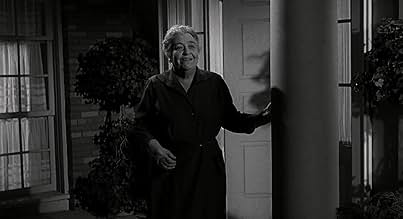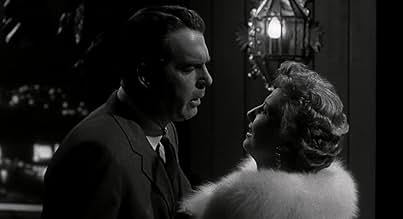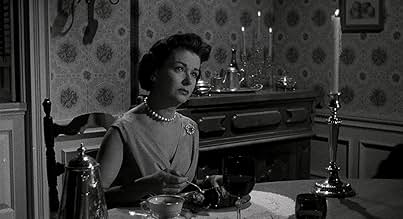IMDb RATING
7.4/10
4.1K
YOUR RATING
When a toy manufacturer feels ignored and unappreciated by his wife and children, he begins to rekindle a past love when a former employee comes back into his life.When a toy manufacturer feels ignored and unappreciated by his wife and children, he begins to rekindle a past love when a former employee comes back into his life.When a toy manufacturer feels ignored and unappreciated by his wife and children, he begins to rekindle a past love when a former employee comes back into his life.
- Director
- Writers
- Stars
- Director
- Writers
- All cast & crew
- Production, box office & more at IMDbPro
7.44K
1
2
3
4
5
6
7
8
9
10
Featured reviews
There's Always Tomorrow
I can not stand Vinny's character. He is so "full of himself." The youngest daughter Frankie drove me crazy with her whining!
Excellent performances by Stanwyck, MacMurray, and Bennett. This is one of the last movies Stanwyck and MacMurray made together, she was as beautiful in this movie as in any of her 1940's movies. She's timeless and such a wonderful actress. For those of you who really like Fred, and want a real treat... Check out the movies "Miracle of the Bells," and "Suddenly it's Spring!" Fred Mac Murray and Barbara Stanwyck were such underrated actors/actresses of their time. Joan Bennett plays her part so well you understand why the household is the way it is. Great love story, if you can get through the kids!
Excellent performances by Stanwyck, MacMurray, and Bennett. This is one of the last movies Stanwyck and MacMurray made together, she was as beautiful in this movie as in any of her 1940's movies. She's timeless and such a wonderful actress. For those of you who really like Fred, and want a real treat... Check out the movies "Miracle of the Bells," and "Suddenly it's Spring!" Fred Mac Murray and Barbara Stanwyck were such underrated actors/actresses of their time. Joan Bennett plays her part so well you understand why the household is the way it is. Great love story, if you can get through the kids!
An under-rated gem. Stanwyck is superb.
In Southern California, Cliff (Fred MacMurray) is a successful toy manufacturer but at home, he feels neglected and taken for granted by his wife (Joan Bennett) and three children - two of whom are teenagers. Norma (Barbara Stanwyck) is a former colleague and friend who pays a visit after many years away. The two lonely souls strike a solid companionship but the film asks the question: will there be more than just friendship?
While watching this film, it's often tempting to expect a formulaic story and guess where it will go next. But, as written by Bernard Schoenfeld (based on a story by Ursula Parrott), it often goes in a different direction. When it does veer in predictable territory, it still does so with some unexpected surprises.
It helps to have the solid direction of Douglas Sirk ("All That Heaven Allows" (1955), "Written on the Wind" (1956) and "Imitation of Life" (1959)) as well as a solid cast. MacMurray is superb in a role rarely shown on screen - a neglected patriarch who feels the hurt. But Stanwyck is truly at her best (which is saying a lot) in a multi-layered role.
At the beginning, she shows true charm, class, and charisma as someone so well-mannered and entertaining, one would want to be in her presence at any gathering. As a successful fashion designer, she's almost comical in a scene of being in such demand for time at her office that she ends up snapping at everyone. In the later dramatic scenes, she shows her true power especially during a conversation with Cliff's teenage children. This performance matches what is likely her best - in "Stella Dallas" (1937).
It makes one yearn for the times in Hollywood when experienced actresses over forty got roles that showed their best. Those days may be gone for now but at least films like this are great reminders of a great era. - dbamateurcritic
OUTSTANDING ACHIEVEMENT: Acting by Barbara Stanwyck
While watching this film, it's often tempting to expect a formulaic story and guess where it will go next. But, as written by Bernard Schoenfeld (based on a story by Ursula Parrott), it often goes in a different direction. When it does veer in predictable territory, it still does so with some unexpected surprises.
It helps to have the solid direction of Douglas Sirk ("All That Heaven Allows" (1955), "Written on the Wind" (1956) and "Imitation of Life" (1959)) as well as a solid cast. MacMurray is superb in a role rarely shown on screen - a neglected patriarch who feels the hurt. But Stanwyck is truly at her best (which is saying a lot) in a multi-layered role.
At the beginning, she shows true charm, class, and charisma as someone so well-mannered and entertaining, one would want to be in her presence at any gathering. As a successful fashion designer, she's almost comical in a scene of being in such demand for time at her office that she ends up snapping at everyone. In the later dramatic scenes, she shows her true power especially during a conversation with Cliff's teenage children. This performance matches what is likely her best - in "Stella Dallas" (1937).
It makes one yearn for the times in Hollywood when experienced actresses over forty got roles that showed their best. Those days may be gone for now but at least films like this are great reminders of a great era. - dbamateurcritic
OUTSTANDING ACHIEVEMENT: Acting by Barbara Stanwyck
10Savor
An outstanding hidden treasure waiting to be rediscovered.
This film is one of the great Hollywood films yet so few have ever heard of. Not only does it rate with Douglas Sirk's better known films ("Magnificent Obsession," "All that Heaven Allows," and "Imitation of Life), but is as much a devastating a critique of the American Dream as other fifties movies like "Bigger Than Life." And unlike many melodramas which center on the emotional isolation and turmoil of the central female character, this one analyzes the pain of the main male figure (Fred MacMurray). The film's acting, direction, and script have a precision so well thought out that the effect--both at any given moment and overall --is absolutely astonishing. An incredible film crying out to be rediscovered.
Clifford the Robot Man
Pasadena toy manufacturer Fred MacMurray (as Clifford "Cliff" Groves) is wealthy and successful, but feels neglected by his busy family. His children are preoccupied with their own lives and loving wife Joan Bennett (as Marion) always finds herself committed to something other than time with Mr. MacMurray. He feels ignored, unappreciated and lonely. Enter former employee Barbara Stanwyck (as Norma Miller-Vale). Formerly plain, but now an attractive dress designer, Ms. Stanwyck arrives in Los Angeles on business. She's clearly interested in rekindling something with MacMurray...
The best part here is that "There's Always Tomorrow" has director Douglas Sirk working in the 1950s, with his best photographer Russell Metty. This means artful shadows, stairways, windows and reflections. Such visuals, especially as they complement the story, are great. There is even a scene with Stanwyck's face shedding tears that are actually reflected raindrops; a technique said to have originated with "In Cold Blood" (1967). Quite possibly, this was done even earlier...
The cast is strangely unimpassioned. MacMurray and Stanwyck lack the level of spark they conveyed in previous collaborations. Perhaps this is the point. MacMurray has become like the toy robot he created. He's "Rex" the walkie-talkie mechanical man. Stanwyck appears to be hesitating an attempted seduction. While not the protagonist, she becomes the most interesting character. Completely and most maddeningly in the dark, Ms. Bennett acts robotically unaware of the threat to her supposedly perfect family life. Shaking things up is suspicious and literate son William Reynolds (as Vinnie).
******* There's Always Tomorrow (1/20/56) Douglas Sirk ~ Fred MacMurray, Barbara Stanwyck, Joan Bennett, William Reynolds
The best part here is that "There's Always Tomorrow" has director Douglas Sirk working in the 1950s, with his best photographer Russell Metty. This means artful shadows, stairways, windows and reflections. Such visuals, especially as they complement the story, are great. There is even a scene with Stanwyck's face shedding tears that are actually reflected raindrops; a technique said to have originated with "In Cold Blood" (1967). Quite possibly, this was done even earlier...
The cast is strangely unimpassioned. MacMurray and Stanwyck lack the level of spark they conveyed in previous collaborations. Perhaps this is the point. MacMurray has become like the toy robot he created. He's "Rex" the walkie-talkie mechanical man. Stanwyck appears to be hesitating an attempted seduction. While not the protagonist, she becomes the most interesting character. Completely and most maddeningly in the dark, Ms. Bennett acts robotically unaware of the threat to her supposedly perfect family life. Shaking things up is suspicious and literate son William Reynolds (as Vinnie).
******* There's Always Tomorrow (1/20/56) Douglas Sirk ~ Fred MacMurray, Barbara Stanwyck, Joan Bennett, William Reynolds
Wrong said Fred
Yet another impressive Douglas Sirk melodrama centring on the contemporary American family and in this particular film the American husband / father figure. Most of the Sirk movies I've seen seem to put women at the heart of the action but here the emotional crisis is thrust upon Fred MacMurray's toy salesman, a conventional, dutiful husband and father to his three growing children, one boy on the verge of adulthood, one daughter in her late teen, mildly rebellious years and another somewhat childish younger teenager. His wife, played by Joan Bennett, seems preoccupied with the needs and wants of these rather selfish children to the point where she seems ignorant of the effect the cumulative family disinterest is having on his emotional needs.
Just as he's feeling especially insignificant along comes old flame Barbara Stanwyck in her third fine film with MacMurray to fan the sparks of his mid-life crisis into a full-blown blazing passion, to the extent where he has a secret if accidental weekend away with her and quickly comes to contemplate leaving his family for a life of excitement with her. Which way will he turn and what part will his two mortified older children, who in typical Sirkian grand coincidental fashion, learn of his plans, play in his final decision?
Once again, Sirk brings family members to a crisis-point and even if the resolution this time takes a conventional course, still there's real drama in these excellently crafted and written scenes of anything but cosy domesticity. Cynics may make sneering remarks about all this amounting to shallow soap operatics but I think they would be wrong. Post-War Western and especially American society was evolving even against the "I Like Ike" background of greater personal wealth and the growth in consumerism but just under the surface it wasn't all sweetness and light and Sirk was one director who caught that change in attitudes in his mid-50's work.
Once again MacMurray surprised me with the depth and roundedness of his performance as a middle-aged man cornered by society's expectations of him while Stanwyck in one of her last major roles before she, like MacMurray a bit later, turned to TV, is as good as she usually is as the unwitting Eve in Fred's supposed Garden of Eden. Her character of a flamboyant, self-confident, but importantly unmarried career-woman is equally worthy of deeper investigation as MacMurray's worm-turning Mr Suburbia.
Lesser known than other Sirk dramas of the decade it's as good as any of them in my opinion and well worth watching.
Just as he's feeling especially insignificant along comes old flame Barbara Stanwyck in her third fine film with MacMurray to fan the sparks of his mid-life crisis into a full-blown blazing passion, to the extent where he has a secret if accidental weekend away with her and quickly comes to contemplate leaving his family for a life of excitement with her. Which way will he turn and what part will his two mortified older children, who in typical Sirkian grand coincidental fashion, learn of his plans, play in his final decision?
Once again, Sirk brings family members to a crisis-point and even if the resolution this time takes a conventional course, still there's real drama in these excellently crafted and written scenes of anything but cosy domesticity. Cynics may make sneering remarks about all this amounting to shallow soap operatics but I think they would be wrong. Post-War Western and especially American society was evolving even against the "I Like Ike" background of greater personal wealth and the growth in consumerism but just under the surface it wasn't all sweetness and light and Sirk was one director who caught that change in attitudes in his mid-50's work.
Once again MacMurray surprised me with the depth and roundedness of his performance as a middle-aged man cornered by society's expectations of him while Stanwyck in one of her last major roles before she, like MacMurray a bit later, turned to TV, is as good as she usually is as the unwitting Eve in Fred's supposed Garden of Eden. Her character of a flamboyant, self-confident, but importantly unmarried career-woman is equally worthy of deeper investigation as MacMurray's worm-turning Mr Suburbia.
Lesser known than other Sirk dramas of the decade it's as good as any of them in my opinion and well worth watching.
Did you know
- TriviaAcclaimed documentary filmmaker Errol Morris named it as one of his 10 favorite films in the 2002 BFI Sight & Sound Poll.
- GoofsNear the end, Vinnie is telling his girlfriend that he was wrong "about Norma and Cliff" in these exact words. But Cliff is his father; he wouldn't refer to his father by his first name.
- Quotes
Norma Miller Vale: Love is a very reckless thing. Maybe it isn't even a good thing. When you're young and in love, nothing matters except your own satisfaction. The tragic thing about growing older is that you can't be quite as reckless anymore.
- SoundtracksBlue Moon
(uncredited)
Written by Richard Rodgers and Lorenz Hart
Played on one of the toys and heard as a theme throughout the film
- How long is There's Always Tomorrow?Powered by Alexa
Details
- Runtime
- 1h 24m(84 min)
- Color
- Aspect ratio
- 1.85 : 1
Contribute to this page
Suggest an edit or add missing content





































